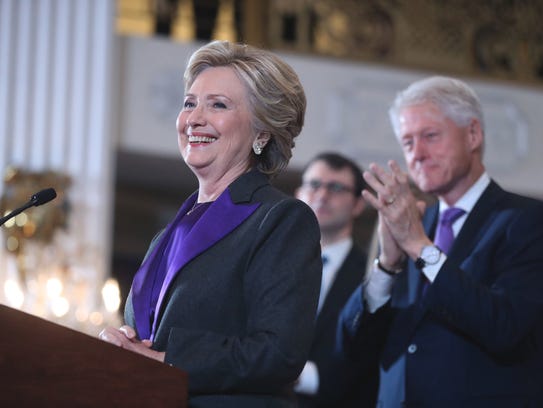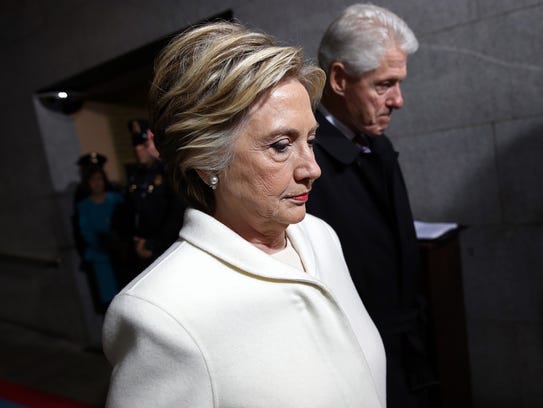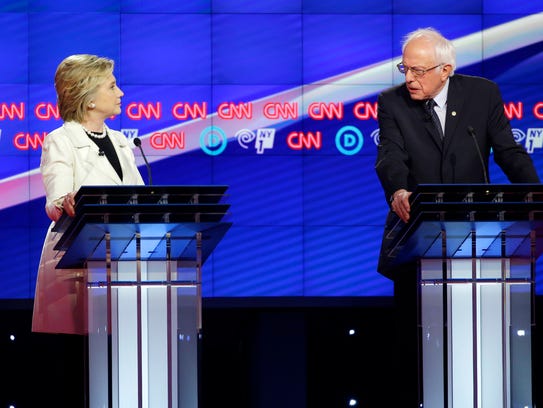
This article is more than
8 year oldCHAPPAQUA, N.Y. — Hillary Clinton says she is now convinced that associates of candidate Donald Trump helped Russia meddle in the 2016 presidential election.
"There certainly was communication and there certainly was an understanding of some sort," Clinton told USA TODAY Monday in a far-ranging interview about her new book, What Happened. "Because there's no doubt in my mind that (Russian President Vladimir) Putin wanted me to lose and wanted Trump to win. And there's no doubt in my mind that there are a tangle of financial relationships between Trump and his operation with Russian money. And there's no doubt in my mind that the Trump campaign and other associates have worked really hard to hide their connections with Russians."
Does she believe there was collusion by Trump associates?
"I'm convinced of it," she said, though she stopped short of repeating that explosive word. "I happen to believe in the rule of law and believe in evidence, so I'm not going to go off and make all kinds of outrageous claims. But if you look at what we've learned since (the election), it's pretty troubling."
STORY FROM LENDINGTREEThe Democratic presidential nominee was sitting in the dining room of the ranch house she and her husband, former president Bill Clinton, bought in August next to their larger home on a cul-de-sac in this leafy Westchester suburb. At the time, she says, they thought it might be a good place not only for visiting family but also for the Secret Service agents and aides who would be accompanying her after the election.
After she won, that is.
Instead, the guest house became a refuge during the months after Election Day when she found herself on the losing side of the biggest political upset in modern American history. She wrote much of the 495-page book on a handsome wooden table, beneath a suffragette's banner that hangs over the fireplace. The memoir, published Tuesday by Simon & Schuster, is in part a raw account of how it felt — less than a year later, the bruises still are fresh — and in part her analysis of why it happened.
Her dress is more casual and her manner less guarded than during the campaign. In an interview that stretched for nearly an hour, as longtime aide Huma Abedin bustled in the living room and kitchen, Clinton didn't pretend to be entirely over the election that landed Trump in the White House — her final campaign, she makes clear.
"I'll always feel terrible that it happened, that I couldn't figure out how to counter all of the stuff that was coming at me in good enough, fast enough real time," she said.
But there is this: She has stopped dreaming about the election.
Clinton says she accepts responsibility for the shortcomings of her campaign, faulting herself for the "bad optics" of delivering high-priced Wall Street speeches, the inartful rhetoric that coal miners saw as an attack on their livelihood, and the "boneheaded mistake" when she decided to use a private email server as secretary of State. She acknowledges she misread the depth of anger and frustration of the electorate.
But she also assigns plenty of blame to others, among them Vermont Sen. Bernie Sanders for his Democratic primary attacks, Putin for Moscow's meddling, the mainstream media for shallow and sensation-driven coverage — and, most of all, then-FBI director James Comey for his handling of the investigation into her emails.
Comey "shivved" her, she writes. She says his unusual announcement 11 days before the election revealing a new trove of emails — which turned out to be not new — cost her last-minute momentum in an election that ended up being determined by less than 80,000 votes in three upper Midwest states.
"My first instinct was that my campaign should hit back hard and explain to the public that Comey had badly overstepped his bounds," she says. "My team raised concerns with that kind of confrontational approach. In the end, we decided it would be better to just let it go and try to move on. Looking back, that was a mistake."
Read more:
Hillary Clinton says Bernie Sanders' attacks 'paved the way' for Trump
Hillary Clinton: Writing new memoir has been 'painful'
President Trump's decision to fire Comey (which she says was the wrong thing to do) was no surprise, but she seems annoyed that it has boosted the FBI director's reputation among some critics. "It was incredible to see Comey go from villain to martyr in five seconds flat," she writes.
To be clear: In her account, he's still a villain.
So is Putin.
She says she knew that the Russian president had a "personal vendetta" against her, dating to NATO's expansion into eastern Europe during her husband's administration and fueled by what he saw as her role in encouraging demonstrations against him in 2011, when she was secretary of State.
"Yet I never imagined that he would have the audacity to launch a massive covert attack against our own democracy, right under our noses — and that he'd get away with it."
During the election, she writes, reporters refused to take seriously Russia's role in the leak of her campaign's emails, and she faults President Obama for not doing more.
"I do wonder sometimes about what would have happened if President Obama had made a televised address to the nation in the fall of 2016 warning that our democracy was under attack," she writes. "Maybe more Americans would have woken up to the thread in time. We'll never know."
In the interview, she said there is more to learn about Russian hacking, about the Wikileaks release of emails from the Democratic National Committee and her campaign chairman, John Podesta, about Facebook ads that can be tied to Russian interests.
Even, perhaps, about Trump's own role.
"Trump mentioned Wikileaks 160 times in October," she said. "Why?" She suggests one possible answer: "He's trying to let people know what he thinks is important and also what he's done and what he knows about? Which I think is a fair question."

There are poignant moments in the book, particularly as she describes trying to get through the first days and weeks after election night.
The suit she had had chosen to wear for her victory speech — white, the color of the suffragettes — stayed in a garment bag. For the concession speech the next morning, she wore a gray and purple suit that she had planned to wear on her first trip to Washington as president-elect. (Purple, the color combination of red and blue, was designed as a subtle tip to bipartisanship.)
On Inauguration Day, watching a rival she had warned was a threat to the nation being sworn in to the job she assumed would be hers, she focused as she walked out on the West Front of the Capitol on breathing. In. Out.
"Scream later," she told herself.
But there are also passages in which Clinton seems to be in a defensive crouch. She pushes back against former vice president Joe Biden's complaint that she never articulated an economic message, reprinting a chart from Vox that showed by far the most frequent word she used in campaign speeches was "jobs."
She doesn't regret or retract her controversial comment that half of Trump's supporters could be put into "what I call the basket of deplorables," although she says the remark amounted to an unintended "political gift" for Trump.
She acknowledges that the loss of Wisconsin was a surprise but denies that the campaign erred by not paying enough attention to the Badger State, saying "we" had campaigned there — although that didn't include stops by her but rather by running mate Tim Kaine and husband Bill.
And she expresses exasperated bewilderment about the strong negative reaction she has elicited from some since the start of her public career.
"What makes me such a lightning rod for fury?" she writes. "I'm really asking. I'm at a loss."

In an interview with USA TODAY in 2014 when Hard Choices was published, Clinton said she believed the sexism that she faced during her 2008 campaign for president had eased and would matter less for a female candidate in 2016.
"It feels different," she said then. "It feels like our country, our society — we've gone through a learning process." There would be "vestiges" of sexism, as President Obama has faced vestiges of racism, she predicted, "but I do believe it would not be as reflexive. It would not be as acceptable."
That isn't how it turned out, she says now.
"I think part of the reason was because of who the candidate was on the other side," she said. "But I also think I may have underestimated the staying power of sexism and particularly the disparity in treatment not just in politics but in all kinds of businesses and academia and society at large."
As she watched Trump prevail despite the 2005 Access Hollywood video, in which he brags about sexually assaulting women, and his attacks of journalist Megyn Kelly and Republican rival Carly Fiorina. "I thought, 'How can this be?'"
Clinton's re-emergence on the public scene and her book — even before its release, pre-orders have pushed it to the top of Amazon's best-seller list — are not entirely welcomed by Democratic leaders still struggling to unite the party and articulate a coherent response to a disruptive new president.
"Please Hillary, don't go there," Democratic Rep. Jared Huffman of California tweeted in response to a report that Clinton blames Sanders' attacks on her integrity for "paving the way" for Trump's "Crooked Hillary" jab. "I supported you. Bernie showed restraint & class & ran aspirational campaign. Politics is rough sometimes."
Sanders dismisses Clinton's book and her critique of him.
“Look, Secretary Clinton ran against the most unpopular candidate in the history of this country and she lost and she was upset about it and I understand that,” the Vermont senator said on the CBS Late Show Thursday. “I think it’s a little bit silly to keep talking about 2016.”

Clinton visibly stiffens when asked whether Sanders' words ("She was upset") were patronizing, even sexist.
"Look, I'm pretty clear in the book about what I think he did in the 2016 primary that was damaging to my campaign against Trump. And I contrast it with what I did at the end of the much closer, much more hard-fought 2008 primary," she said. "He's not a Democrat. That's not a slam on him; that's what he says. He's not a Democrat. So it's a little bit odd for him to be looked to by the press or anybody else as a major voice in the Democratic Party."
Here's what she says is the main lesson for Democrats.
"I guess what I would say to whoever is going to run is, since it worked for Trump, and he was aided and abetted by the Russians, then get ready for something you have never seen before. Because as bad as it was in 2016, they will come back with new tricks."
Clinton, 69, has launched a new umbrella organization to support grass-roots groups, though the working name, Our American Future, was revised to Onward Together when she and aides realized the acronym for the original version would be the mockable OAF.
And she cites the example of Eleanor Roosevelt, who has been an occasional model for Clinton since her days as first lady. Roosevelt rejected encouragement to run for public office, but she didn't retreat from the public stage.
"After her husband died and she left the White House, in 1945," Clinton writes, "she grew even more outspoken."